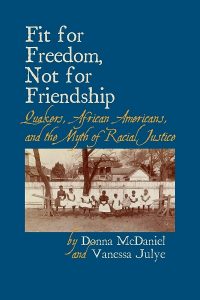 A question has long haunted me: why, among American Quakers, have African Americans historically been Fit for Freedom, (but) Not for Friendship? This is actually the title of a book by Vanessa Julye and Donna McDaniel. Reading the book offered some answers, and convicted me: I had to accept that we as Friends – even though many of us in the past took a leading role in ending slavery – are guilty of structural racism. People of color have historically not felt fully welcomed in our meetings. I encourage all Friends to read this book, from which the following quotations are taken:
A question has long haunted me: why, among American Quakers, have African Americans historically been Fit for Freedom, (but) Not for Friendship? This is actually the title of a book by Vanessa Julye and Donna McDaniel. Reading the book offered some answers, and convicted me: I had to accept that we as Friends – even though many of us in the past took a leading role in ending slavery – are guilty of structural racism. People of color have historically not felt fully welcomed in our meetings. I encourage all Friends to read this book, from which the following quotations are taken:
When one Philadelphia meeting house was enlarged in 1756, the builders were told to allow some “suitable places for African Americans to sit.” (p. 195)
In 1758 . . . North Carolina Yearly Meeting established regular meetings for worship for African Americans at four different locations; Friends attended to make sure that “good order was observed.” (p. 182)
These exclusive practices began with early Friends and set the tone. Even well into the 20th century at least one North Carolina monthly meeting approved a plan to discourage “members of the negro race” from visiting worship services, and if they came, to seat them on designated benches. (1952 Statement – Greensboro Monthly Meeting of Friends)
Continuing revelation has led that Meeting, New Garden and others to endeavor to be much more welcoming to African Americans, and deeply committed to anti-racist work.
In support of the work of Peace & Social Concerns, each week for awhile in this space I will be offering reflections, quotations, queries, facts and ideas focused on anti-racism. Please feel free to respond to me with your own thoughts.

